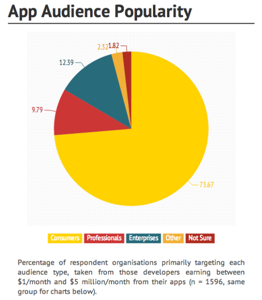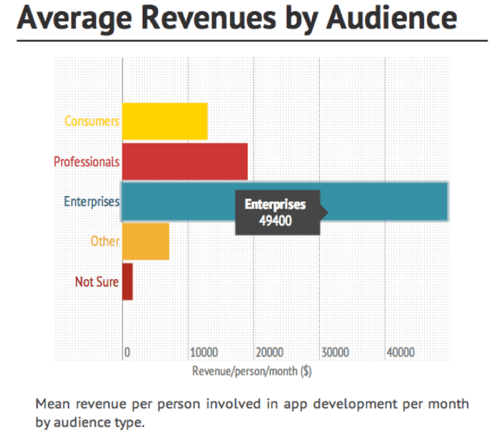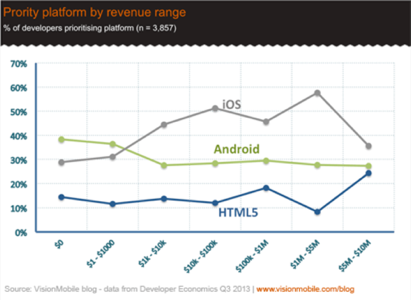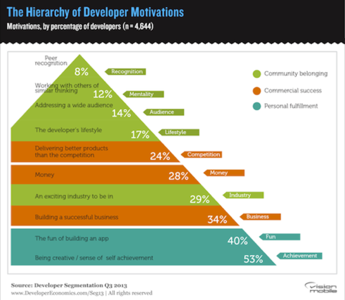While mobile developers may hope to strike it rich with the next Candy Crush Saga, the reality is that enterprise developers stand to make four times as much money building mobile apps than consumer-oriented developers do, according to research from VisionMobile. While money isn’t everything, especially in developer land, for those interested in making a buck, consumer may be the wrong option for mobile developers.
Consumer Gets The Developer Love
Given the boom in consumer mobile, it’s not surprising that developers have been flocking to it, as VisionMobile’s survey shows:

Apple has stoked this consumer fever, touting $10 billion in developer payments and over 50 billion downloads from its popular App Store. Google, for its part, has also been minting money for developers, while foregoing some cash by shutting down some mobile advertising practices that made the Android mobile experience somewhat spammy.
The consumer, in other words, is king for both major mobile platforms.
Enterprise: Boring And Profitable
See also: Why Mobile Developers Are Really Starting To Embrace The Enterprise
Or is it? The problem, as ReadWrite’s Dan Rowinski noted earlier this year, “building apps for consumers is a very hit-or-miss business.” For every Temple Run there are countless tear-your-hair-out failures. For instance, look at Sparrow, a popular email app from a couple of years ago. It was immensely popular but had trouble making money even with its light, agile team and costumes willing to pay. It eventually sold to Google when it realized that the consumer app game is an extremely fickle business and only the runaway hits really make a ton of money.
When it comes to developers actually making money, then, the enterprise is likely a much safer bet, as VisionMobile’s survey indicates:

This may be one reason Appcelerator has been seeing such a shift in the developer population to enterprise apps over the past three years. Since late 2010, enterprise-focused developers have risen from 29.3% of Appcelerator’s survey respondents to 42.7% in the second quarter of 2013, while consumer-focused developers have dropped from 70.7% to 57.2%.
This shift is having a multiplier effect on mobile developers’ paychecks. If you multiply the average revenue per developer by the average size of development team for mobile and enterprise application development, using VisionMobile’s data, enterprise-oriented development teams make 16 times more revenue than consumer-oriented development teams.
The hype may be on consumer, but the steady money is in enterprise.
Interestingly, the more money a developer makes on a given application, the more she skews toward supporting all multiple platforms: iOS, Android and HTML5, in an attempt to maximize potential audience. Lower-grossing apps tend to focus on one platform, which remains iOS.

Regardless of the platform, however, the market seems to matter most. For those developers that care about cash, enterprise is where it’s at.
Where Is The Enterprise Money?
As ReadWrite covered earlier, some industries seem to be picking up on mobile faster than others. The top enterprise sectors embracing mobile are:
- Banking
- Healthcare
- Transportation
- Government
- Telecommunications
- Insurance
- Retail
- Automotive
While there are common needs across these industries, one of the things that makes enterprise mobile so interesting and profitable is the specialization required to help companies compete for customers. As Rowinksi writes, “It is the breadth and variety of enterprise needs (and the billions upon billions of dollars controlled by those companies) that make it such an enticing area for mobile developers.”
Cash Isn’t King With Developers
This assumes, of course, that money is the primary motivation behind mobile development. It’s not. Or not always. As a separate VisionMobile report highlights, a sense of achievement is by far the biggest reason developers build mobile applications:

Enterprise may well prove less inspiring than consumer apps (after all, who doesn’t find iFart and its ilk inspiring?), but I suspect that a few missed rent payments may be enough to steer developers back to the market that pays: enterprise. Besides, as noted above, it’s not true that enterprise apps are necessarily dull. You mother may never get to use the mobile service you built to track the logistics of an enterprise’s truck fleet across the U.S., but she’ll appreciate that you’re not living in her basement as you chase consumer mobile riches.
Regardless, we’re still in the early, frothy period of the mobile market, and it’s natural for developers to gravitate toward sexy, cool consumer apps. Whether they’ll be able to stick with their passion to the exclusion of their incomes is a different matter.
Top image courtesy of Shutterstock.

















